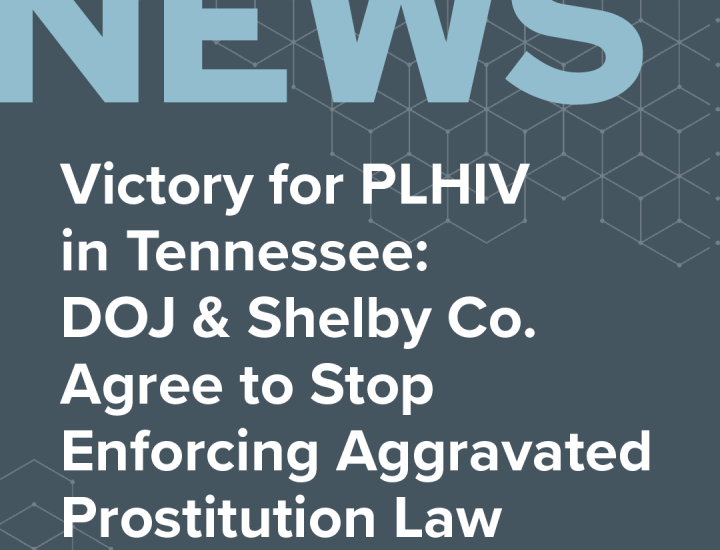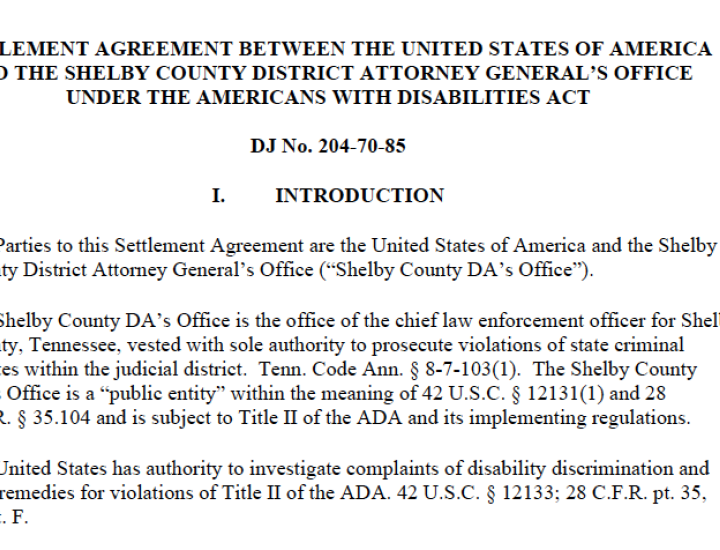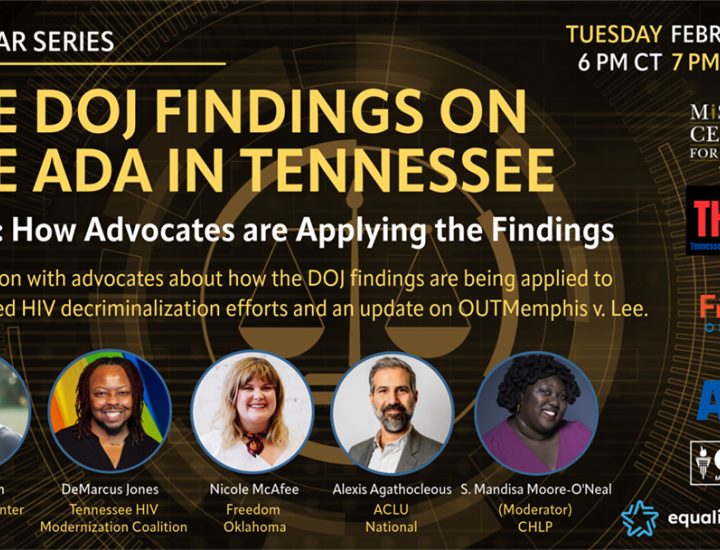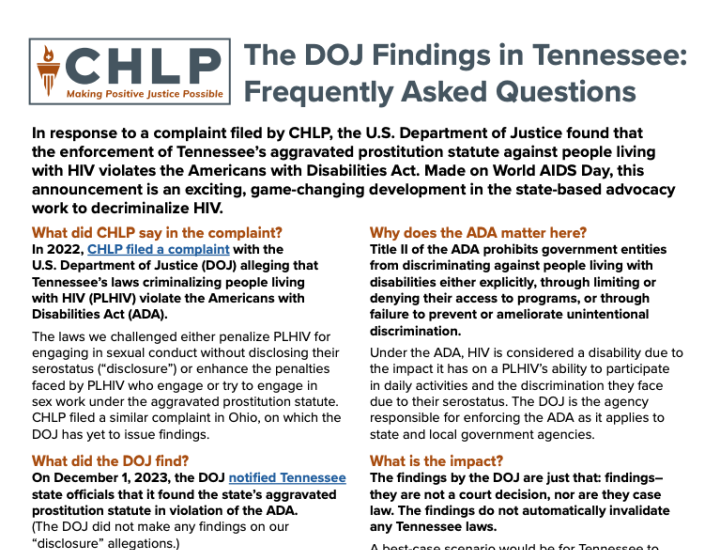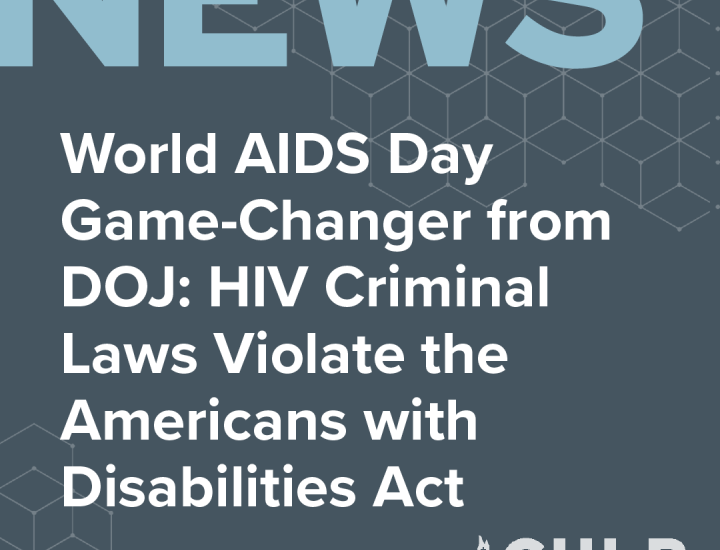MLK50 Op-ed: Memphis needs to end HIV criminalization to achieve justice and promote public health
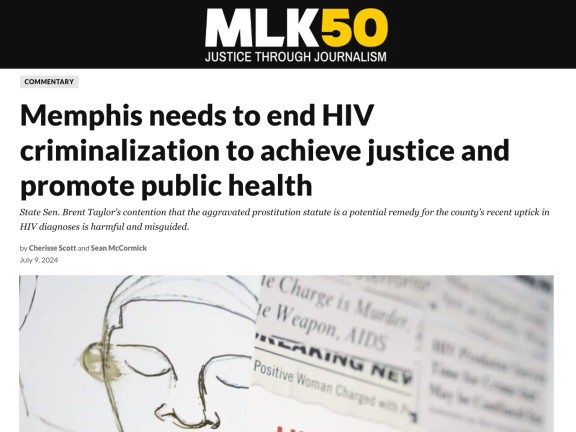
CHLP Staff Attorney Sean McCormick and Sister Reach CEO Cherisse Scott authored this op-ed in MLK50 to counter misinformation about and the politicization of the recent Shelby County, Tennessee, settlement with the Department of Justice regarding the enforcement of the aggravated prostitution statute. This settlement will stop singling out people living with HIV for heightened criminal penalties based on their health status, a form of discrimination that violates the Americans with Disabilities Act.
"There must be ongoing and intentional investment in evidence-based public health strategies, such as community-based prevention and treatment programs, that center the dignity and experiences of the Black and LGBTQIA+ Memphians most affected by the HIV epidemic and these misguided criminal laws."
Read the full op-ed at MLK50 or below.
Memphis needs to end HIV criminalization to achieve justice and promote public health
State Sen. Brent Taylor’s contention that the aggravated prostitution statute is a potential remedy for the county’s recent uptick in HIV diagnoses is harmful and misguided.
by Cherisse Scott and Sean McCormick
July 9, 2024
Ceasing enforcement of the aggravated prostitution statute in Shelby County is an overdue step in ending the criminalization of people living with HIV, especially Black women living with HIV in Memphis, and advancing public health.
Prosecutors in Shelby County agreed with the U.S. Department of Justice to stop singling out people living with HIV for heightened criminal penalties based on their health status, a form of discrimination that violates the Americans with Disabilities Act.
Unfortunately, in what appears to be an attempt to politicize the settlement, state Sen. Brent Taylor has challenged this agreement in a letter to the Tennessee Attorney General. His letter is misleading and inaccurate.
First, it is irresponsible for an elected official to question the legality of DOJ settlements when they are commonly used to enforce federal law. The City of Memphis, for example, reached a settlement with the DOJ in 2013 to resolve ADA violations caused by the design of the Liberty Bowl Memorial Stadium.
Second, Taylor suggests the DOJ should challenge the statute in court, ignoring the fact that, in February, the DOJ initiated a lawsuit against the state. This lawsuit followed the DOJ’s December findings letter that concluded the enforcement of the aggravated prostitution statute by the State of Tennessee violates the ADA.
Third, Taylor also requested that the attorney general consider the appointment of a special prosecutor to prosecute people living with HIV for aggravated prostitution. The senator’s contention that the aggravated prostitution statute is a potential remedy for the county’s recent uptick in HIV diagnoses is his most harmful and misguided claim.
Research shows that HIV criminalization laws are not effective in reducing HIV transmission but could actually increase transmission rates. Knowing one’s HIV status is the first step to addressing upticks in HIV diagnoses. However, because these laws, including the aggravated prostitution statute, only apply to individuals who are aware of their status, they likely discourage people from engaging in testing. The setup for an oral swab HIV test. Photo by Andrea Morales for MLK50
HIV criminalization laws additionally exacerbate the stigma against people living with HIV and further marginalize people from care, particularly Black LGBTQIA+ people who are already stigmatized due to the intersection of institutional racism and queerphobia. Tennesseans must further navigate sexual relationships, within or outside of the context of marriage, in the Bible Belt, which is another intersectional factor that often dissuades people from being tested or talking about their status.
Let’s also remember that Republican state leaders recently rejected federal HIV prevention funding. While state money replaced some of these funds, Gov. Bill Lee has focused on first responders, survivors of human trafficking victims, and pregnant women, despite data showing Black, brown and LGBTQIA+ people remain the most deeply affected by HIV in Tennessee.
There must be ongoing and intentional investment in evidence-based public health strategies, such as community-based prevention and treatment programs, that center the dignity and experiences of the Black and LGBTQIA+ Memphians most affected by the HIV epidemic and these misguided criminal laws.
SisterReach, for example, has offered free HIV education, testing and connection to care in Memphis for more than a decade. In 2019, we launched our YouMeHIV campaign to encourage cisgender Black women to be tested and to raise visibility and awareness about HIV among this highly neglected population. We are the only Black-led organization providing HIV testing that focuses on working with other Black-led organizations to support their capacity in collaboration. We also launched Mildred’s Circle, a support group led for and by Black women living with an HIV diagnosis. We are committed to quelling HIV transmission rates in Tennessee by empowering people through life-saving, comprehensive reproductive and sexual education and tools to engage in sexual activity as safely as possible.
The misinformation regarding the DOJ’s involvement in Shelby County spread by Taylor is very troubling, as it threatens this historic milestone in the fight against the criminalization of and discrimination against people living with HIV. We must embrace this turn toward compassionate services to end the HIV epidemic in Memphis and across Tennessee. And applying a reproductive and sexual justice analysis is an important part of achieving the best health outcomes by keeping those most impacted in the center of the lens and on the frontlines of their own liberation and wellness.
Cherisse Scott is the founder and CEO of SisterReach. Sean McCormick is staff attorney at the Center for HIV Law and Policy.
